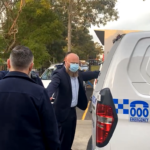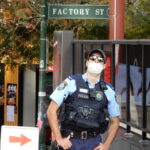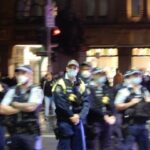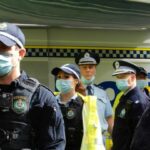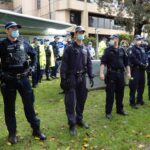Sydney Deputy Mayor Calls Out Heavy-Handed NSW Police, Ahead of WorldPride
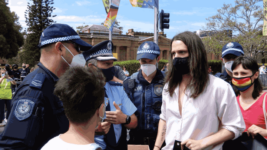
The warrantless use of sniffer dogs by NSW police in public has been rising since it commenced in the early 2000s. And over the last decade, officers have been increasingly using strip searches in response to a drug dog indication, which result in nothing being found two-thirds of the time.
These well-established facts and the resulting negative impacts of these actions have on the community have been raised as a matter of concern by the City of Sydney in relation to the upcoming WorldPride event to be held in its local government area over February/March next year.
In adopting the Oxford Street LGBTIQA+ Social and Cultural Place Strategy on 31 October, Sydney council unanimously supported an amendment put by Greens deputy mayor Sylvie Ellsmore to ensure that the plan to revamp the precinct included measures to prevent heavy-handed policing.
Lord mayor Clover Moore reiterated the stance in the Herald a few days later, outlining that the City of Sydney does not want the expected 500,000 attendees from across the globe to be confronted by walls of armed blue bodies and accompanying dogs at the various WorldPride events.
And Ellsmore points out that council engagement with the community on the issue of safety around the Oxford Street precinct found that young LGBTIQA+ people have been feeling intimidated by the NSW police presence and the drugs dogs in the area.
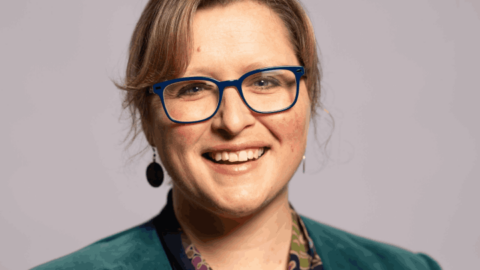
Ending police intimidation
“Oxford Street historically hasn’t always been a safe place,” said Ellsmore. “It’s been a place where people from the LGBTIQA+ community have gathered, rallied and protested, but there’s also been an unfortunate history of homophobic violence from the community and sometimes from police.”
“The strategy rightly looked at that and said council needs to work cooperatively with NSW police to make sure we are keeping everybody safe,” the City of Sydney deputy mayor told Sydney Criminal Lawyers.
Sydney council outlines in its strategy that its approach is about “recognising and preserving the LGBTIQA+ history of Oxford Street, maintaining contemporary LGBTIQA+ character, increasing visibility and spaces for LGBTIQA+ culture, and keeping the community connected and safe.”
And as this strategy looks beyond the scope of WorldPride 2023, the decision to “address and prevent heavy-handed policing in the precinct” aims to eradicate these practices long-term in the inner-city area in response to the finding that they make “many LGBTIQA+ people feel unsafe”.
“If we’re going to have a conversation about safety and police, we’ve got to be honest about how certain groups in our community still feel intimidated by police when they police in a particular way,” Ellsmore maintained, adding that this is especially about the policing of illicit substances.
Defunding and decriminalisation
There’s been a strange equation playing out with the policing of drugs in NSW: as the understanding has been growing that the zero-tolerance law enforcement approach to illicit drug use results in increasing the harms associated with it, so too has the police use of such tactics been on the rise.
This has resulted in some shocking revelations around the conduct of officers whilst having teens strip off in the pursuit of small quantities of drugs, as well as the NSW Coroner calling out the practice of using drug dogs as it leads to dangerous drug-taking practices that can prove lethal.
“There are too many police in our communities, and they’re directed to do the wrong thing,” Ellsmore continued. “This is set by policy. Police play an important role in keeping people safe but it’s clear they’ve been given directions in terms of increased sniffer dogs and strip searches.”
“This is an issue about the leadership of the police directing officers to do particular things out of step with what the community wants and are actively harmful for the community, which create bad relationships and make it even harder for people to report things when they really need to.”
According to the Sydney deputy mayor, both the Liberals and Labor have been “unwilling to have a conversation about how we need less police” and how the policing of recreational drug use, which is ultimately a health issue, needs to come to an end.
Indeed, Ellsmore supports the decriminalisation of personal drug use and possession, as does the Australian Greens, and an ever-broadening number of civil society organisations and regular members of the constituency.
However, the majors are addicted to tough law and order policies, despite many of their members supporting such measures as well, with the reason being that dinosaurs in those parties, both young and old, consider that the zero-tolerance approach to drugs equals votes at the ballot box.
A drug dog free city
“As we have WorldPride coming up there’s going to be a big focus on partying and there will be recreational drug use and it’s incredibly important that it’s not met with sniffer dogs and heavy-handed policing,” Ellsmore said, getting back to the crux of the matter.
And she underscored that the focus should be on “keeping people healthy and safe and having a good time”.
The deputy mayor pointed out that the City of Sydney has a good relationship with NSW police, and as a major partner in WorldPride 2023, it will be sitting down with senior police, naming the issues that are of concern and having a conversation about how they can be better addressed.
That’s been the purpose of moving the motion and the public comments that have been made about preventing the heavy-handed policing in the Oxford Street precinct, especially at a time when the globe will not only be watching but visiting the city as well.
“This is more about having a conversation about doing these things differently and it’s important to be clear about what the community expectations are,” Ellsmore said in conclusion.
“And the expectations are that we keep everybody safe and having a good time. Not that they’re heavily policed by sniffer dogs over summer.”


